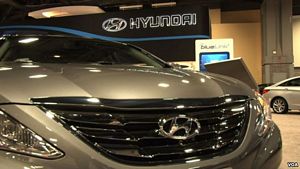|
By accessing or using The Crittenden Automotive Library™/CarsAndRacingStuff.com, you signify your agreement with the Terms of Use on our Legal Information page. Our Privacy Policy is also available there. |

US Auto Execs Agree With Trump on Unfair South Korea Trade Deal
|
|---|
|
|
US Auto Execs Agree With Trump on Unfair South Korea Trade Deal
Brian Padden, VOA News
28 July 2016
 FILE - A new Hyundai under the lights at an auto show. FILE - A new Hyundai under the lights at an auto show.
|
SEOUL — U.S. Republican presidential candidate Donald Trump’s recent attacks on the U.S.-South Korean free trade agreement as a “job killing deal” are causing some anxiety across the Pacific, but his sentiments in this case are echoing frustrations long voiced by pro-trade American automobile industry leaders.
“There is no question the Korean marketplace is one of the most difficult for any automaker to export into, in the world,” said Matt Blunt, the President of the American Automotive Policy Council and former governor of the U.S. state of Missouri.
Trump has said the free trade deal "doubled our trade deficit with South Korea and destroyed nearly 100,000 American jobs."
He has promised to negate and renegotiate unfair trade deals if elected president.
Non-tariff regulations
Nearly 80% of the current $28 billion U.S. trade deficit with Korea is in the automotive sector, according to the American Automotive Policy Council.
In South Korea foreign cars make up only 15 percent of the market, compared to 40 percent in developed countries like the U.S. and European nations.
However, the foreign car market share in Korea has been increasing in recent years. In 2010 foreign car imports accounted for only 3 percent of the Korean market.
In 2014 Ford Motor Company executive Stephen Biegun testified before the U.S. Congress on the bilateral trade deal that that took effect in 2012 and eliminated 95 percent of tariffs on consumer and industrial products over a five-year period.
In his testimony, Biegun said the South Korean government has engaged in a deliberate strategy to circumvent the free trade agreement by imposing non-tariff related regulations.
These measures imposed on U.S. carmakers but not on Korean manufacturers, he said, are often introduced without notice, and create unwarranted new environmental standards and certification procedures.
The situation today has improved in some respects, but Blunt says American car companies still spend an inordinate amount of time and money dealing with emerging non-tariff regulations.
“Beyond that you have this whole degree of uncertainty about what the marketplace is going to be like and what the regulatory requirements will be,” said Blunt.
The U.S. Treasury Department has also put South Korea, along with China and Japan, on a currency watch list this year to assess whether these countries are artificially manipulating their foreign-exchange rates to gain an unfair trade advantage.
Trade benefits
South Korean officials have downplayed the charges that regulations are hindering American companies from doing business in the country and deny currency manipulation charges.
Kim Tae-nyun, the executive managing director of the Korea Automobile Manufacturers Association (KAMA) says all outstanding grievances over non-tariff measures have already been resolved through bilateral negotiations.
“We improved our industrial system regarding the environmental regulations and safety regulations according to the request by the U.S. government and the industry,” Kim said.
South Korea’s Finance Minister Yoo Il-ho recently said that the benefits from the free trade agreement with the United States far outweigh the disadvantages.
While there is still a substantial trade deficit, U.S. auto imports into South Korea have increased more than 20 percent in the last two years, according to KAMA.
And South Korean carmakers Hyundai and Kia have opened manufacturing plants in the U.S. that create jobs for American workers.
While many South Korean officials discount Trumps’ charges of unfair trade as election related rhetoric, there is growing concern that the U.S. will pursue more protectionist policies in the future, no matter which candidate wins the U.S. presidential election in November.
“We have some concerns if there is some other recasting on top of the current agreement, there will be some kind of reverse discrimination against Korean carmakers,” said Kim.
Bipartisan concern
U.S. Ambassador to Seoul Mark Lippert has also called on the South Korean government to fully implement the KORUS free trade agreement and to eliminate unnecessary regulations.
Hillary Clinton endorsed the KORUS deal in 2011 when she was Secretary of State, but as the U.S. Democratic Party candidate for president she has been more critical of free trade deals.
Clinton withdrew her support for the pending Trans-Pacific Partnership (TPP) that includes the United States and 11 other Pacific Rim countries. She said any new trade agreements must include strong protections for American workers, raise wages and create more good jobs at home.
Critics say her conversion on the issues of globalization and trade was a political move made during the primary campaign to counter growing popular support for her socialist rival Bernie Sanders, who is a vocal advocate for more protectionist policies.
At the Democratic Party convention in Philadelphia this week a longtime Clinton supporter Terry McAuliffe, the governor of the state of Virginia, caused a stir when he suggested Clinton would eventually support TPP with some minor changes.
Clinton campaign chairman John Podesta responded immediately via Twitter saying, “Hillary opposes TPP BEFORE and AFTER the election. Period. Full stop."
Youmi Kim in Seoul contributed to this report.

















 Topics: Donald J. Trump
Topics: Donald J. Trump
 FILE - A new Hyundai under the lights at an auto show.
FILE - A new Hyundai under the lights at an auto show.
